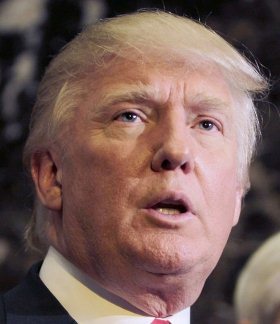Iran Nuclear Accord: Two Months since the U.S. Quit

President Donald Trump in May withdrew the United States from a hard-won accord that Washington and other world powers signed with Iran in 2015 to curb Tehran's nuclear program.
As foreign ministers of Iran and the five other signatories -- Britain, France, Germany, China and Russia -- meet in Vienna on Friday to find ways to keep the deal alive, here is a look-back over developments since Trump's withdrawal.
- Washington walks away -
Trump pulls the United States out of the landmark nuclear pact on May 8, reinstating Washington's sanctions on Iran and companies with ties to the Islamic republic.
"The Iran deal is defective at its core," he says.
Washington warns other countries to end trade and investment in Iran and stop buying its oil or face punitive measures, a move which also threatens foreign companies doing deals with Iran.
Tehran's regional rivals Saudi Arabia and Israel applaud the decision. But Britain, France and Germany say they are determined to save the deal and its economic benefits for Iran.
- Threats to resume enrichment -
On May 12 Foreign Minister Mohammad Javad Zarif says Iran is preparing to resume "industrial-scale" uranium enrichment, limited under the accord, unless Europe provides solid guarantees to maintain trade ties reinstated under the deal.
Washington warns on May 21 that Iran will be hit with the "strongest sanctions in history" unless it abides by controls on its nuclear program.
On May 24 the UN's nuclear watchdog, the IAEA, says Iran continues to respect the terms of the 2015 accord.
On May 30 the United States places several Iranian state groups on its sanctions blacklist, accusing them of serious human rights abuses and censorship.
On June 4 Iran notifies the IAEA of the launch of a plan to increase its uranium enrichment capacity. Israeli Prime Minister Benjamin Netanyahu claims this is aimed at producing nuclear weapons to be used against his country.
- 'Attack foiled' in France -
On June 30 authorities say they have foiled an alleged plot to bomb a rally by an exiled Iranian opposition group based in France also attended by leading U.S. figures including former New York mayor Rudy Giuliani, Trump's personal lawyer.
Six people are arrested in Belgium, France and Germany.
The People's Mujahedeen of Iran charges that the Iranian regime is behind the alleged plot.
But Tehran dismisses it is a "false flag" designed to overshadow an upcoming trip to Europe by Rouhani to seek assurances that the nuclear deal can be maintained. The president arrives in Switzerland on July 2.
- Deal-saving talks -
A top U.S. official says on July 2 that Washington is determined to force Iran to change behavior by cutting its oil exports to zero, confident the world has enough spare oil capacity to cope.
U.S. secondary sanctions on firms dealing with Iran would "snap back" in August for trade in cars and metals and in November for oil and banking transactions, the State Department official says.
Rouhani responds on July 3 saying the United States can never prevent Iran from exporting its oil.
In Vienna on July 4 he says Iran "shall remain party to the accord ... on condition that we can also benefit from it."
But, on the eve of the foreign ministers' talks in Vienna, the Iran state news agency IRNA reports that Rouhani told French President Emmanuel Macron in a phone call on July 5 that a European offer on the table "does not meet all our demands."



